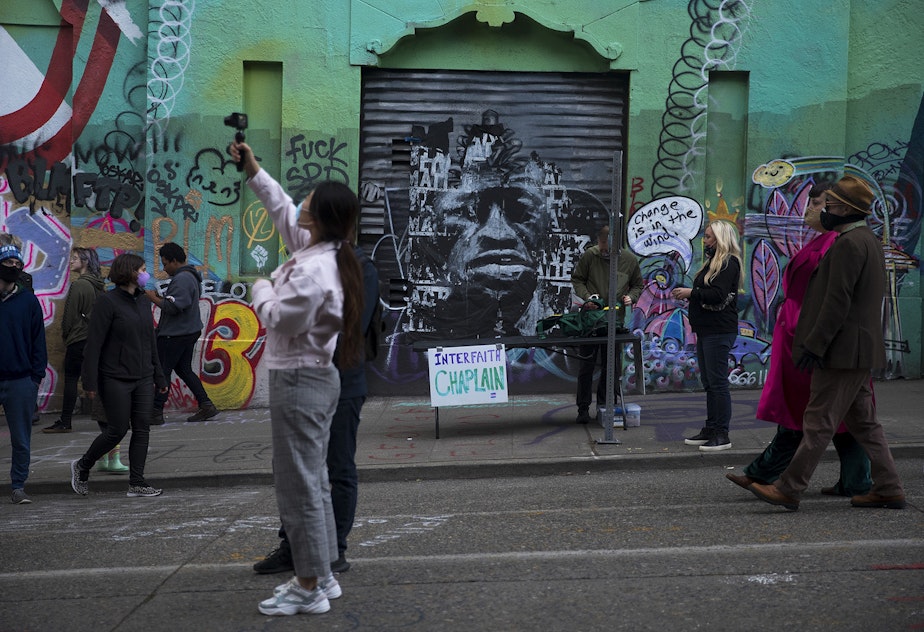Race and the justice system: 3 areas to target, according to this Seattle professor

Professor Bob Crutchfield is a sociologist at the University of Washington who studies the justice system. He shared with us three areas of the system he believes should change -- and asks where are the voices of cops who want reform.
1
Bail: The poor can’t afford it, which makes them more likely to get a longer sentence.
When a person is kept in jail after arrest, their chances of conviction go up substantially. And if convicted, or if they plead guilty, their chances of a longer sentence increase. A person who's in jail can't help their own defense and can't do the things that help them get a lesser sentence.
Bail standards, as they're used in many parts of the country, unfairly affect people of color because it's a money system, and poverty is higher in communities of color.
In most cases, it's possible to move away from a money bail system.
The second thing we could do is to take a deep look at our standards and ask ourselves, are they race neutral?
Sponsored
We've actually finally made headway in Washington state. Washington revised its bail standards to try to make them more race neutral. What the effect of that has been, I'm not certain.
2
Public defender system: Doesn’t exist in some counties in Washington state.
In many states, particularly back East, public defender systems are robust and well supported across the state to make sure felony defendants have better representation.
But almost everywhere, they're underfunded. In Washington state it's particularly problematic, because it varies so much at the county level.
In the Puget Sound region, and particularly in King County, there is a well-developed public defender system. But in other counties, it's not developed at all. They have a group of attorneys that do pro bono work when the courts need them, but there's no such systemic support.
Sponsored
The prosecution on the other side will always have police and sheriff's departments that help with investigations.
People might say, people who come in contact with the police were violating the law. And there's some truth to that in part, but that's not quite true, because patterns of enforcement vary.
We've done research on racial differences in context with police, among juveniles. And what we find is, as we take into account any criminal involvement differences, African American kids are more likely to have contact with the police than are white kids.
This has consequences for them as they move through school, and then it has consequences for them in their young adult years, such that anyone who has contacts with police has a heightened likelihood of continuing to be in trouble with law enforcement and with criminal justice system as they move through school and into their young adult years.
But for African Americans, it's even more. This cannot be explained by crime differences.
Sponsored
3
Unions: Some cops want reform. Where are their voices?
My bias is pro-union. But I have real concerns about police unions. They are reasonably positioned themselves to look out for their members, to protect their members, and that's to be expected.
The question is how far they go. When they stand in the way of reform, when they say it's a bargaining issue to be traded off for higher salaries or other benefits, it's not putting community first.
When efforts were made in Washington state to bring this state in line with, with most other states on what it takes to convict a police officer of wrongdoing, our local police union in Seattle opposed that vociferously.
We had the most [tough] law in the country to do that, because prosecutors would have to true prove that a police officer was acting with malice. That's a very difficult standard to achieve. So people here in Washington state were reasonably trying to change that. And it wasn't to go in a radical direction, it was simply to be like other states.
Sponsored
When some former police members of police leadership came out in favor of it, they were vilified. I have to believe that among police – the membership of police unions – there are many who really want to do the job the way they envisioned it when they came on police forces, and they want reform. The question is, where are their voices?
I've had police officers not here in Seattle, but elsewhere in the country, tell me that it's very difficult to go against the prevailing norms and beliefs in police departments. Because if you do that, you're pretty negatively sanctioned within.
We have to break that down so that the voices within police can be heard.
This transcript was edited for length and clarity.
This story is part of a weeklong series on systemic racism in our institutions. Here are the interviews:
Race and the justice system: 3 areas to target, according to this Seattle professor
Race matters: Understanding how the Central Area was gentrified
Race is not a health risk factor. Racism is

